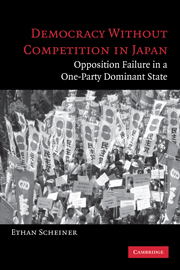Book contents
- Frontmatter
- Contents
- Tables and Figures
- Glossary of Abbreviations
- Acknowledgments and a Note on the Use of the Online Appendix
- Introduction: The Puzzle of Party Competition Failure in Japan
- 1 The Importance of Party Competition and a Model of Party Competition Failure
- 2 Opposition Failure in Japan: Background and Explanations
- 3 Clientelism and Its Determinants
- 4 The Impact of Clientelism and Centralized Government Financial Structure: Comparative Analysis
- 5 Local Opposition Failure in Japan
- 6 National-Level Opposition Failure: The Impact of Subnational-Level Weakness
- 7 Political Economy Changes and Their Impact on Party Systems: Comparative Analysis
- 8 Parallel Party Systems: Political Economy Changes and the Limits to Anti-Clientelist Appeals in Japan
- 9 The Problem of Organization and Coherence in Top-Down Party Formation
- 10 Conclusion: Democracy Without Competition
- References
- Index
1 - The Importance of Party Competition and a Model of Party Competition Failure
Published online by Cambridge University Press: 02 December 2009
- Frontmatter
- Contents
- Tables and Figures
- Glossary of Abbreviations
- Acknowledgments and a Note on the Use of the Online Appendix
- Introduction: The Puzzle of Party Competition Failure in Japan
- 1 The Importance of Party Competition and a Model of Party Competition Failure
- 2 Opposition Failure in Japan: Background and Explanations
- 3 Clientelism and Its Determinants
- 4 The Impact of Clientelism and Centralized Government Financial Structure: Comparative Analysis
- 5 Local Opposition Failure in Japan
- 6 National-Level Opposition Failure: The Impact of Subnational-Level Weakness
- 7 Political Economy Changes and Their Impact on Party Systems: Comparative Analysis
- 8 Parallel Party Systems: Political Economy Changes and the Limits to Anti-Clientelist Appeals in Japan
- 9 The Problem of Organization and Coherence in Top-Down Party Formation
- 10 Conclusion: Democracy Without Competition
- References
- Index
Summary
A democracy predicated on the ability to “throw the rascals out” is far less convincing when it exists only in the abstract than when it is backed up by periodic examples of rascals actually flying through the doors.
T. J. Pempel (1990: 7)This is a book about how party competition can fail.
The ability of opposition parties to challenge ruling regimes is integral to representative democracy. A viable opposition is important not just because competitive elections are a necessary condition of most definitions of democracy (e.g., Schumpeter 1942) but because opposition is in fact a critical check on a country's rulers. Writing in the Schumpeterian tradition, scholars such as Downs (1957) and Schlesinger (1991) tell us that in order to get elected, parties are drawn to reflect the public's will. In competing with each other for votes, parties are in fact vying to better represent the general public. Where one party is dominant, there is little competition, and, as a result, the dominant party need not be very responsive. Party competition forces political elites and voters alike to consider alterations to the existing political agenda; examine alternative ideological, cultural, or policy ideas; and reevaluate which societal groups should be represented by the government and how.
In some cases, the impact of competition may appear insignificant to all but the most involved observer, as it simply leads to debate over “minor” details of legislation, but in many other cases the impact is more obviously profound.
- Type
- Chapter
- Information
- Democracy without Competition in JapanOpposition Failure in a One-Party Dominant State, pp. 7 - 30Publisher: Cambridge University PressPrint publication year: 2005



